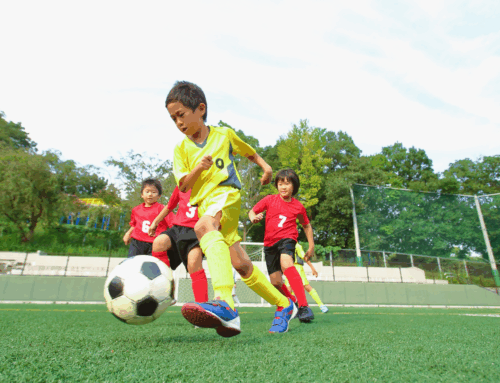Get our exclusive report. Download the iSport360 Club Switching Report Here – For Club Admins, Rec Leaders and Coaches.
Teaching Kids to Support Teammates—Even When Competing
One of the biggest challenges in youth sports is teaching kids how to balance competition with teamwork. On one hand, kids want to stand out, earn playing time, and score points. On the other, they’re part of a team where every player matters. It’s not always easy for young athletes to cheer for teammates when they’re competing against them for spots, positions, or recognition—especially when that teammate just snagged the starting position they’ve been working toward all season.
As parents, we see the tension play out in real time. A child may feel jealous when a teammate scores more points. They might struggle when another player gets more minutes on the field. And sometimes, kids simply don’t know how to respond when their friend succeeds in a moment they wished was theirs. The awkward silence, the forced smile, the halfhearted “good job”—we’ve all witnessed it from the sidelines.
But learning to support teammates during challenging moments is one of the most valuable lessons in sports. Here’s how parents can guide kids through it without turning every car ride home into a therapy session.
Why It’s Hard for Kids to Support Teammates
It’s completely normal for kids to feel jealous or disappointed when they see teammates succeed in areas where they wish they could shine. A player might be frustrated if another child earns the starting position, receives praise from the coach, or gets extra playing time. For young athletes, these moments can feel deeply personal. They may think, “Why not me?” or worse, “What am I doing wrong?”
These emotions aren’t a sign of poor character—they’re part of growing up and learning how to navigate competition. The key is helping kids understand that those feelings are natural but shouldn’t prevent them from showing support to their teammates. You can feel disappointed for yourself and genuinely happy for someone else at the same time. It’s not easy, but it’s possible.
The Parent’s Role
The truth is, parents can be just as competitive as the kids—sometimes even more so. I’ve tracked minutes and second-guessed subs. It stings when another kid gets the credit my child deserved. Having that competitiveness in common with our kids gives us an opportunity to lead by example.
Parents strongly influence how kids view competition within a team. What children hear at home or in the car shapes their attitudes. If they hear parents comparing players, criticizing teammates, or focusing only on stats, they’ll start to see teammates as rivals rather than allies. And trust me, kids pick up on those subtle comments we think they’re not hearing.
Shifting the conversation makes a real difference. Parents can praise effort instead of just results, recognize the value of every player on the team, and emphasize collective success over individual recognition. When parents model encouragement—even when it stings a little—kids learn that supporting teammates doesn’t take away from their own accomplishments. Instead, it builds a stronger team environment where everyone benefits.
We don’t have to tell our children that winning doesn’t matter or pretend that individual success isn’t important. But we can model what it looks like to be a team player, even when our competitive instincts are screaming otherwise.
Teaching Practical Ways to Support Teammates
Sometimes kids need concrete examples of what supporting teammates looks like in action. General advice like “be a good sport” has all the specificity of telling them to “be nice”—technically correct but not particularly helpful.
Instead, they can practice simple habits like:
- High-fiving or fist-bumping a teammate after a good play
- Cheering when someone else scores or makes a strong defensive stop
- Offering encouragement when a teammate makes a mistake (“You’ll get the next one!”)
- Celebrating team wins instead of focusing only on personal stats
These are small actions, but they make a big impact. When kids consistently support each other, the team dynamic improves and players start to understand that everyone’s success contributes to something bigger than individual glory.
Helping Kids Handle Jealousy (Because It’s Going to Happen)
Even with guidance, kids will still feel jealous at times. The goal isn’t to eliminate those emotions—good luck with that—it’s to help kids process them in healthy ways.
Start by listening without immediately jumping into fix-it mode. Let children share their frustrations without dismissing them or launching into a speech about gratitude. Once they feel heard, it’s easier to shift their perspective.
You can remind your child that every athlete has unique strengths and weaknesses, and that their own contributions are valuable even if they don’t always show up in obvious ways. Maybe they’re the one who keeps team morale up, or they’re improving faster than anyone else, or they make everyone around them play better. Pointing out examples where they’ve been supported by teammates can also help them recognize the importance of giving that same support back.
Over time, kids learn that jealousy doesn’t need to control their behavior. They can feel it, acknowledge it, and choose to act differently anyway.
Coaches as Allies
Parents don’t have to navigate this alone, and honestly, we shouldn’t try to. Coaches also shape how kids view competition within the team. A strong coach sets expectations early: teammates support each other, period. No exceptions, no excuses.
Parents can reinforce this by backing up the coach’s messages. If your child complains about a teammate’s success, remind them of the team values the coach has established. This shows kids that parents and coaches are on the same page, which makes the lesson even stronger. It also prevents the “but Mom said…” conversations.
The Real Win
Supporting teammates in competitive situations helps kids practice both celebrating others and pursuing their own success. It teaches them resilience, empathy, and perspective—skills that matter long after the final whistle.
At the end of the day, kids who learn to cheer for teammates, especially when it’s hard, become the kind of teammates everyone wants to play with. More importantly, they become adults who know how to handle competition in healthy ways, whether in school, work, or life. And in a world where collaboration often matters more than individual achievement, that’s a pretty valuable skill to master on the soccer field.
Ian Goldberg is the CEO of Signature Media and the Editor of the largest and fastest growing sports parenting newsletter. He’s been recognized as an industry expert by the National Alliance for Youth Sports, the US Olympic Committee’s Truesport, and the Aspen Institute’s Project Play. Ian is also a suburban NJ sports dad of two teenage daughters and has over 2,000 hours of volunteer time coaching them (which he calls the most fun form of R&D for his newsletter content). Ian and his team provide players, coaches, parents and program directors with the articles and content they need to have a great sports season. Ian has spent most of his career in digital product development and marketing and got his start at the White House where he worked for the economic advisors to two US Presidents.
Learn more or request a demo of our youth sports software that is helping teams improve communication, organization and player development.
September 10, 2025





